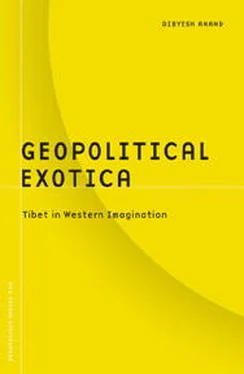Working within the framework of a patron-client relationship, Tibetans have managed to construct and reinforce a national identity by drawing upon the patronage of transnational networks and connections. Klieger's analysis of Tibetan nationalism as a modern manifestation of the "patron-client dyad" argues that the Tibetans living in diaspora have been able to retain their status by converting the entire exile community into the client category (1994, 84-120). This is not to argue that a coherent ideology of nationalism accepted by the entire Tibetan diaspora has emerged. The idea of Tibet as a nation is a contested political construct that involves the manufacturing of unity out of tremendous difference and diversity.
Soliciting international support has been one of the main strategies of the Tibetan diaspora elite. The Dalai Lama's well-publicized and frequent trips to various countries are a significant part of this strategy of raising the profile of the Tibetan cause in the international media and mobilizing public opinion in the Western states. Conspicuous avoidance of the Tibet question in the conventional fora of international relations, epitomized by the lack of recognition of Tibetan statehood by any existing state, has forced the Tibetans to seek support through nonconventional means-cultural politics is a part of this. The ultimate goal behind the transnational mobilization remains the assertion of the right to self-determination. Tibetan-ness thus is a transnational phenomenon, a political practice that transgresses national boundaries but does not question the spatial logic through which these boundaries have come to constitute and frame the conduct of international relations. In a dedication at the beginning of his autobiography, Palden Gyatso reflects a sentiment common to most Tibetans, a hope that international support might help them realize their goal of independence: "And to all of you who inhabit the world who also believe in the virtues of truth, justice and decency… Help to deliver us. Help us to be free, to be independent, to be able to do what we choose-in our own country" (1997).
The imaginative hold and consequent impact of Exotica Tibet is evident in the activities of various Tibet support groups. The support in the form of the "Free Tibet" movement is often based on the image of "Tibet as defenseless underdog, a spiritual society that was minding its own business only to get crushed under the jackboot of an aggressive, materialist overlord" (Schell 2000, 206). However, even the cultivation of this victimization paradigm reflects the agency of Tibetans. Though Tibetan global publicity campaigns consciously portray Tibetans as victims of Chinese oppression, this does not deny them their subjectivity. Instead, they have made conscious and extensive use of Western discourses-whether psychology, philosophy, physics, personal growth, or holistic health-in their attempts both to communicate with Westerners and to reconstitute themselves in conditions of exile (Bishop 1997, 67). Tibetans have colluded with, as well as contested, various Western images of Tibet.
Though many Westerners may like to overrate their own importance in nurturing Tibetan resistance to China, resistance to domination always exists in all societies (Bass 1990, 218), and Tibet is no exception. [67]Dominant cultural and political ideas (in this case Western and Chinese) influence the precise forms that the resistance takes. In the diaspora, it is the preservation of traditional culture and nationalism that is the main dynamic behind the politics of resistance. Within Tibet, this ranges from protest movements demanding independence to forces demanding accommodation of special rights within the Chinese state structure. In either case, it reveals the political agency of Tibetans.
The extent to which the awareness-raising campaigns of the Tibet support groups in the West translate into substantive political support and activism is open to question. In fact, the existing support for the Tibetan cause is based on Exotica Tibet, particular representations of Tibetans as inherently spiritual and peaceful people. This restricts the alternatives available to those Tibetans (see Lazar 1998; Shakya 1991) who might be disillusioned with the Dalai Lama's insistence on nonviolence and his renunciation of the demand for independence. Instead of deriving satisfaction solely from high-profile support for Tibet based on particularized images, many Tibetans are frustrated with the limitations imposed by this on their political struggle. Tsering expresses this sentiment very clearly when he writes, "As for our friends and supporters, while we greatly appreciate their sympathy and support, it is not for them to determine what the goal should be" (1998, 43). The adoption of a human rights model by a Tibetan exile elite, as discussed briefly in the previous chapter, has limitations as in the West this model provided a "language that could be used ambiguously so that the domestic audience would be seen as criticizing China while Chinese officials might be persuaded that the criticisms were sufficiently mild so as not to be threatening to fundamental concerns" (Barnett 2001, 291).
Thus, while molding their identity discourses according to Western exoticized imagery has helped Tibetans in gaining substantial popular support, there is a strong realization among many that this is not an end in itself. As Shakya points out, unlike other international political problems such as the Palestinian one, the Tibetan issue is seen in terms of sentimentality. "If the Tibetan issue is to be taken seriously, Tibet must be liberated from both the Western imagination and the myth of Shangri-la" (1991, 23). It therefore comes as no big surprise that while the international support for Palestinians often comes from other third world countries, Tibet support groups are more common in the civil society of the first world. [68]This has partly to do with the limited success of the Tibetan government-in-exile in establishing networks in the third world. The Tibetan exiles turned for support to former colonizers rather than to the formerly colonized and chose public relations rather than political alliance as their form of politics (Barnett 2001, 279).
TIBETAN (TRANS)NATIONAL IDENTITY: THE TENSIONS WITHIN
The institutional as well as the symbolic practices of the Dalai Lama-led Dharamsala establishment encourage people to act socially and cohesively as Tibetans in an "alien" environment. [69]The emphasis on constructing a unity does not mean an elision of differences within the community. As in any other vibrant society, one can find here differences based on generation, socialization, gender, religiosity, region, sect, period of departure from Tibet, class, and political opinions (see Ardley 2002; Diehl 1998). The popular tendency within the media, Tibet support groups, and many Tibetans themselves, is to represent the Tibetan diaspora community as united under the leadership of the Dalai Lama. However, significant differences can be seen within the diaspora between the Tibetans coming from the U-Tsang region and Khampas and Amdowas. Difference is definitely witnessed in religious matters, as in the Shugden affair [70]or the Rumtek monastery controversy, [71]or, for that matter, in less-publicized differences within the monasteries in South Asia between the old arrivals and the newcomers (see Strom 1997, 39-42). Significant generational differences are also found within the diaspora on matters such as the role of religion in society (is it an end in itself or a cultural resource?); outmigration from South Asia (whether to stay in the region close to the community or move out to Western countries for improvement in individual standard of living); influence of popular Indian and Western culture (should one assimilate with the dominant culture or retain separation?); and political priorities (whether to emphasize preservation of traditional Tibetan culture or focus primarily on the explicitly political demands). [72]In political matters too the diaspora is divided. Study of statements by the Tibetan government-in-exile reveals an ambiguity in their primary political demands (at http://www.tibet.com). While the right of Tibetans to self-determination is asserted, often it is argued in terms of significant and real autonomy within China, sometimes on the model of "One Country, Two Systems" as has been followed in the case of Hong Kong. On the other hand, there are more radical intellectuals and activists within the Tibetan diaspora who make a strong and unambiguous case for struggling toward complete independence (see Lazar 1998). [73]There are several other opinions on this matter. A middle ground is expressed in the Hear Tibet! campaign calling for a United Nations-backed referendum within Tibet allowing the Tibetan people themselves to choose their own political future (see Hear Tibet! 2001).
Читать дальше












